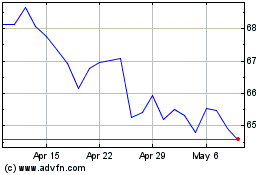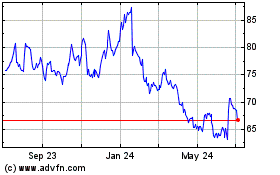FDA Panel Backs Approval of Liver-Disease Drug
April 07 2016 - 6:40PM
Dow Jones News
A U.S. Food and Drug Administration advisory panel recommended
the agency approve a new drug for the treatment of a rare liver
condition—the latest milestone in a rapidly growing market for
liver-disease drugs.
The FDA's panel of outside advisers voted 17-0 Thursday that
there was substantial evidence to support FDA approval of Intercept
Pharmaceuticals Inc.'s drug, obeticholic acid, to treat a condition
called primary biliary cirrhosis, or PBC. The disease destroys bile
ducts in the liver and can lead to life-threatening complications
requiring liver transplants.
While primary biliary cirrhosis is relatively rare, analysts
believe Intercept's drug has big sales potential because the
company also plans to seek regulatory approval for it to treat a
more common liver disease known as nonalcoholic steatohepatitis, or
NASH. Credit Suisse predicts sales of obeticholic acid could reach
$159 million in 2018 if it is approved for primary biliary
cirrhosis this year, but eventually could rise to annual sales of
$6.5 billion if cleared for NASH.
The drug was the focus of much attention in 2014 when positive
clinical data caused Intercept shares to rally, but then the stock
plunged on concerns that the drug might cause abnormal cholesterol
levels in NASH patients. Those concerns weren't a major part of
Thursday's FDA panel discussion because it focused on the drug's
use to treat primary biliary cirrhosis, and lipid changes in these
patients weren't significant in studies.
The market for liver-disease drugs is booming. Gilead Sciences
Inc. has racked up billions of dollars in sales in recent years for
its new drugs to treat hepatitis C, and Merck & Co. and AbbVie
Inc. have introduced competing hepatitis C drugs. Gilead this week
agreed to pay $400 million, with a potential for $800 million in
future payments, to acquire another company developing a treatment
for NASH.
Last week, the FDA approved a new drug from Jazz Pharmaceuticals
to treat a life-threatening liver condition known as hepatic
veno-occlusive disease.
"These blockbuster markets have attracted drug companies because
these are areas of potential new drug options, huge unmet needs,
and global epidemics," said RBC Capital Markets analyst Michael
Yee.
Intercept is seeking to market its drug to treat primary biliary
cirrhosis patients who don't improve while taking an older drug
called ursodeoxycholic acid, or are unable to tolerate the older
drug. The FDA, which isn't bound by its advisory committees but
often follows their advice, is expected to make a final decision by
May 29.
In a clinical trial, patients who received obeticholic acid had
improved measures of liver function a year after starting
treatment, compared with patients who received a placebo. The most
common side effect was itchy skin, which led some patients to stop
taking the drug.
Intercept was a little-known drug startup until January 2014,
when its share price nearly quadrupled in a single day on news that
obeticholic acid had performed well in a clinical trial of patients
with NASH. The National Institute of Diabetes and Digestive and
Kidney Diseases, which conducted the trial, halted it early because
patients had shown significant improvement.
The NIDDK revealed that it had concerns about abnormal
cholesterol levels in patients taking it in the NASH trial, but
company later said the cholesterol effects appeared to be
manageable.
Intercept shares, which were halted in trading Thursday, closed
Wednesday at $163.83, down more than 60% from their peak in
2014.
The company, which operates out of offices in Manhattan's
Meatpacking District, hasn't turned a profit to date. It was
founded in 2002 by an Italian professor and an American venture
capitalist and had an initial public offering in 2012.
Intercept's clinical study in PBC used a short-term measure of
liver function in patients as a surrogate to predict long-term
benefit, given that the disease progresses slowly over many years.
Members of the advisory panel said Thursday they believed the
surrogate measure was sufficient, but encouraged long-term
follow-up.
"Weighing the risks and benefits in the setting of patients with
PBC, with limited treatment options, I think it's very reasonable
to go forward," Linda A. Feagins, a panelist and associate
professor of medicine at the University of Texas Southwestern
Medical Center, said at the meeting.
Intercept Pharmaceuticals said Thursday it was pleased that the
FDA panel "recognized the unmet need in this population, and the
potential" of its drug to help patients.
Shares of Intercept, up 21% over the past three months, rose
9.6% to $179.50 in after-hours trading.
Write to Peter Loftus at peter.loftus@wsj.com
(END) Dow Jones Newswires
April 07, 2016 18:25 ET (22:25 GMT)
Copyright (c) 2016 Dow Jones & Company, Inc.
Gilead Sciences (NASDAQ:GILD)
Historical Stock Chart
From Mar 2024 to Apr 2024

Gilead Sciences (NASDAQ:GILD)
Historical Stock Chart
From Apr 2023 to Apr 2024
